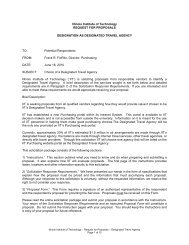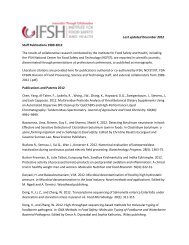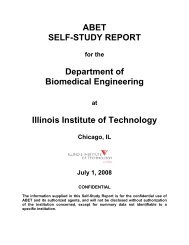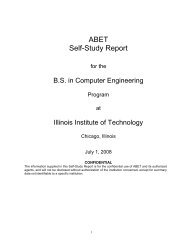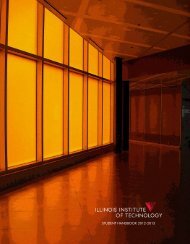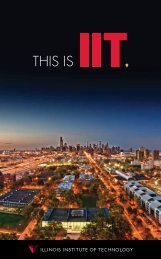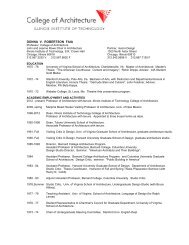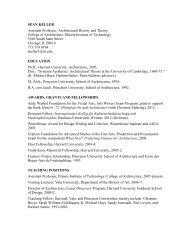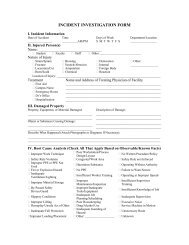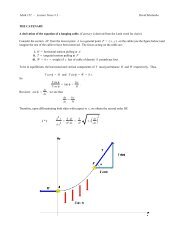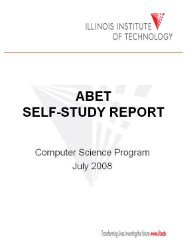Copyright & Disclaimer Information - Illinois Institute of Technology
Copyright & Disclaimer Information - Illinois Institute of Technology
Copyright & Disclaimer Information - Illinois Institute of Technology
You also want an ePaper? Increase the reach of your titles
YUMPU automatically turns print PDFs into web optimized ePapers that Google loves.
Special Program Note for the Chemical Engineering Program<br />
The Interpr<strong>of</strong>essional Project Experience<br />
Students in the chemical engineering program must be<br />
enrolled in six credits <strong>of</strong> Interpr<strong>of</strong>essional Projects according<br />
to the following format:<br />
• CHE/IPRO 296 Introduction to IPROs (1 credit)<br />
• IPRO 497 Interpr<strong>of</strong>essional Project (3 credits)<br />
• CHE/IPRO 496 Design IPRO (2 credits)<br />
IPRO 497 provides the opportunity to enroll in an<br />
IPRO <strong>of</strong>fered by any academic unit. CHE/IPRO 296 and<br />
CHE/IPRO 496 create a package to accomplish interdisciplinary<br />
teamwork for process design. CHE/IPRO 496<br />
Chemical Engineering<br />
Chemical engineering is concerned with the design, development<br />
and management <strong>of</strong> facilities that convert raw<br />
materials into useful products. The engineer must assume<br />
responsibility for the economical use <strong>of</strong> the raw materials,<br />
preservation <strong>of</strong> the environment, and pr<strong>of</strong>itability <strong>of</strong> the<br />
operation. The chemical engineering program has been<br />
Coursework<br />
The chemical engineering curriculum emphasizes basic<br />
knowledge and applications <strong>of</strong> transport processes,<br />
thermodynamics and kinetics <strong>of</strong> processes, automatic<br />
control, and design, as well as fundamental sciences,<br />
mathematics and engineering sciences. Design experience<br />
is spread across the curriculum, beginning with the<br />
Introduction to the Pr<strong>of</strong>ession courses. Equipment design<br />
is emphasized in courses such as Fluid Mechanics,<br />
Heat and Mass-Transfer Operations, Thermodynamics,<br />
and Chemical Reaction Engineering. Control-system<br />
design is practiced in the Process Control course. Process<br />
Pr<strong>of</strong>essional Training<br />
Pr<strong>of</strong>essional training is stressed equally in the design <strong>of</strong><br />
the chemical engineering curriculum. Because engineering<br />
is largely a team effort, the department develops the individual’s<br />
ability to work effectively as a team member.<br />
Group projects are assigned starting with the Introduction<br />
to the Pr<strong>of</strong>ession course. Laboratory course and capstone<br />
design course projects are conducted by teams <strong>of</strong> students.<br />
The laboratory work is designed to reinforce the concepts<br />
developed in the lectures and to show the application<br />
<strong>of</strong> chemical engineering principles to the solution <strong>of</strong><br />
<strong>Copyright</strong> & <strong>Disclaimer</strong> <strong>Information</strong>: <strong>Copyright</strong> © 1994, 1995, 1996, 1997, 1998, 1999, 2000, 2001, 2002, 2003, 2004, 2005, 2006, 2007. CollegeSource®, Inc. and Career Guidance Foundation. CollegeSource® digital catalogs are derivative works owned and copyrighted by CollegeSource®, Inc. and Career Guidance Foundation. Catalog content is owned and copyrighted by the appropriate school. While CollegeSource®, Inc. and Career Guidance Foundation provides information as a service to the public, copyright is retained on all digital catalogs.<br />
<strong>Copyright</strong> & <strong>Disclaimer</strong> <strong>Information</strong>: <strong>Copyright</strong> © 1994, 1995, 1996, 1997, 1998, 1999, 2000, 2001, 2002, 2003, 2004, 2005, 2006, 2007. CollegeSource®, Inc. and Career Guidance Foundation. CollegeSource® digital catalogs are derivative works owned and copyrighted by CollegeSource®, Inc. and Career Guidance Foundation. Catalog content is owned and copyrighted by the appropriate school. While CollegeSource®, Inc. and Career Guidance Foundation provides information as a service to the public, copyright is retained on all digital catalogs.<br />
Chemical and Environmental Engineering<br />
students attend one lecture weekly on process design and a<br />
weekly two-hour meeting with the expanded IPRO group<br />
and their project adviser. The expanded IPRO group<br />
consists <strong>of</strong> the CHE/IPRO 496 students, CHE/IPRO 296<br />
students and students from other academic units who have<br />
registered for the relevant IPRO 497 sections (3 credit<br />
hours). CHE/IPRO 296 students provide support to the<br />
specific design activity through literature survey, data<br />
generation and use <strong>of</strong> design s<strong>of</strong>tware as appropriate.<br />
CHE/IPRO 496 students are responsible for developing<br />
and designing the process. IPRO 497 students enrich<br />
the project by extending the work into their areas <strong>of</strong><br />
specialization.<br />
designed to provide both the engineering competence<br />
and the pr<strong>of</strong>essional skills necessary to succeed in this<br />
endeavor. In order to achieve this objective, the curriculum<br />
incorporates coursework in both <strong>of</strong> these areas<br />
throughout the four-year duration <strong>of</strong> the program.<br />
modeling, simulations and optimization are discussed<br />
and practiced in Transport Phenomena, Process Modeling<br />
and System Theory, Numerical and Data Analysis,<br />
Statistical Tools for Engineering, and Process Control<br />
courses. The capstone design courses (Chemical Process<br />
Design and Process Design IPRO) integrate these design<br />
concepts and practice process design and optimization.<br />
In addition to engineering competence, the program also<br />
examines the economic, environmental and societal<br />
implications <strong>of</strong> chemical engineering.<br />
real-world problems. Because individual attention is so<br />
important to the student’s growth, laboratory sections are<br />
small and a high level <strong>of</strong> personal contact between student<br />
and instructor is maintained. Students are encouraged to<br />
become involved with state-<strong>of</strong>-the-art research projects at<br />
the undergraduate level. The industry/university co-op program<br />
is available to students who would like to use one or<br />
more extra semesters any time after their sophomore year<br />
to work on an internship in industry.<br />
IIT Undergraduate Bulletin 2006–2008<br />
65



